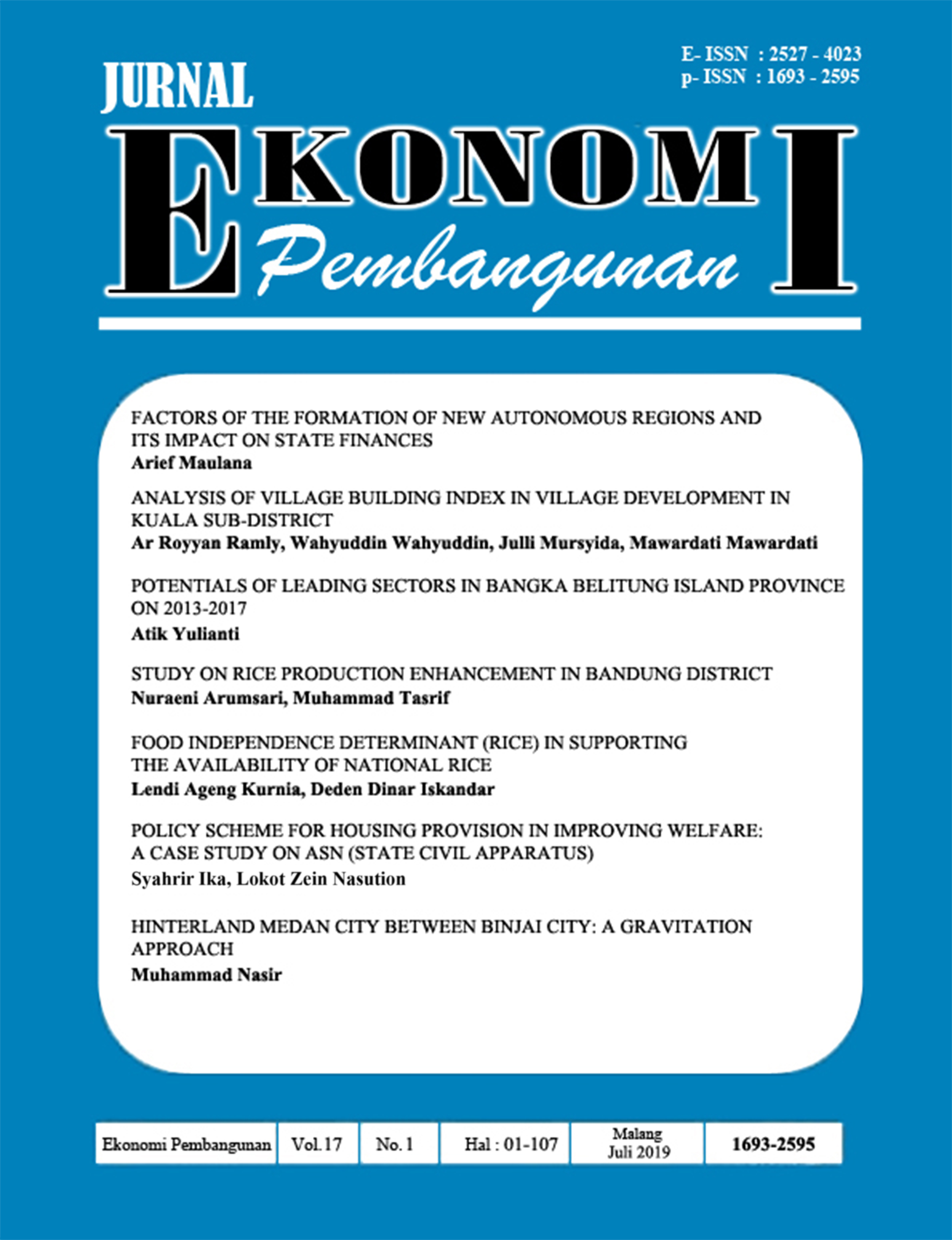Potentials Of Leading Sectors In Bangka Belitung Island Province On 2013-2017
DOI:
https://doi.org/10.22219/jep.v17i1.7893Keywords:
Economic Decentralization, Location Quation, Superior Sector of Bangka Belitung Islands ProvinceAbstract
Decentralization and regional autonomy policies provide opportunities for development of governments and communities in the regions. The economic and financial potential needs to be extracted and processed, so it could be a tangible output that gives an additional value to the product which lead to improving the welfare of the people in the Bangka Belitung Islands Province. Regional economics can be divided into two sectors, namely basic activities and activities rather than bases. This study uses Location Quotient method to find out and analyze the basic or superior sectors in the Bangka Belitung Islands Province. Based on the results of the research, Mining and Excavation sector, Government administration sector, Agricultural sector, Health and services sector, Real estate sector, Manufacturing industry and the big and retail trade sector; are those who have more than 1 local offering so they can be favored for the Bangka Belitung Islands Province in 2013-2017.
Downloads
References
Ambardi, Urbanus M dan Prihawanto, Socia. 2002. Pengembangan Wilayah dan Otonomi Daerah. Pusat Pengkajian dan Kebijakan Pengembangan Wilayah (P2KKTPW – BPPT). Jakarta.
Arsyad, Lincolin. 1999. Pengantar Perencana dan Pembangunan Ekonomi Daerah. Yogyakarta: BPFE.
Arsyad, Lincolin. 2010. Ekonomi Pembangunan. Yogyakarta: UPP STIM YKPN.
Bank Indonesia. 2007. Kajian Ekonomi Regional Propinsi Kepulauan Bangka Belitung Triwulan III 2007. Jakarta
Basuki, Agus Tri dan Gayatri, Utari. 2009. Penentu Sektor Unggulan dalam Pembangunan Daerah: Studi Kasus di Kabupaten Ogan Komering Ilir. Jurnal Ekonomi dan Studi Pembangunan, Volume 10, No.1,
BPS. 2017. Provinsi Bangka Belitung Dalam Angka 2017, BPS Provinsi Kepulauan Bangka Belitung
Glasson, Jhon. 1990. Pengantar Perencanan Regional, terjemahan Paul Sitohang, LPFE, Jakarta.
Hood, Ron. 1998. Economic Analysis A Location Quotient. Primer. Principal Sun Region Associates, Inc
Hudiyanto, 2013, Ekonomi Pembangunan, Pusat Pengembangan Ekonomi Universitas Muhammadiyah Yogyakarta, Yogyakarta.
Isserman, Andrew. M. 1977 The Location Quotient Approach for Estimating Regional Economic Impacts. AIP Journal.
Kementerian Perdagangan. 2007. Analisis Dampak Kebijakan Ekspor Timah Terhadap Kinerja Timah Indonesia. Pusat Kebijakan Perdagangan Luar Negeri/ Jakarta
Miller, M M., Gibson, J L,. dan Wright, G N. 1991. Location Quotient Basic Tool for Economic Development Analysis. Economic Development Review, 9(2).
Sugiyono. 2008. Metodologi penelitian Kuantitatif, Kualitatif, dan R& D. Jakarta: Alfabeta.
Sukirno, Sadono. 1994. Pengantar Teori Makroekonomi. Edisi Kedua. Jakarta: PT Rajawali Grasindo Persada.
Sulista. 2019. Peran Masyarakat dan Daya Tarik Ekonomi Bagi Penambang. Jurnal Teknologi Mineral dan Batubara.
Tarigan, Robinson. 2005. Ekonomi Regional-Teori dan Aplikasi Edisi Revisi. Jakarta: Bumi Aksara.
Downloads
Published
Issue
Section
License
Authors who publish with Jurnal Ekonomi Pembangunan (JEP) agree to the following terms:
- For all articles published in Jurnal Ekonomi Pembangunan (JEP), copyright is retained by the authors. Authors permit the publisher to announce the work with conditions. When the manuscript is accepted for publication, the authors agree to the publishing right's automatic transfer to the publisher.
- Authors retain copyright and grant the journal right of first publication with the work simultaneously licensed under a Creative Commons Attribution-NonCommercial-ShareAlike 4.0 International License that allows others to share the work with an acknowledgment of the work's authorship and initial publication in this journal.
- Authors can enter into separate, additional contractual arrangements for the non-exclusive distribution of the journal's published version of the work (e.g., post it to an institutional repository or publish it in a book), with an acknowledgment of its initial publication in this journal.
- Authors are permitted and encouraged to post their work online (e.g., in institutional repositories or on their website) before and during the submission process, as it can lead to productive exchanges and earlier and greater citation of published work (See The Effect of Open Access).

This work is licensed under a Creative Commons Attribution-NonCommercial-ShareAlike 4.0 International License.






















